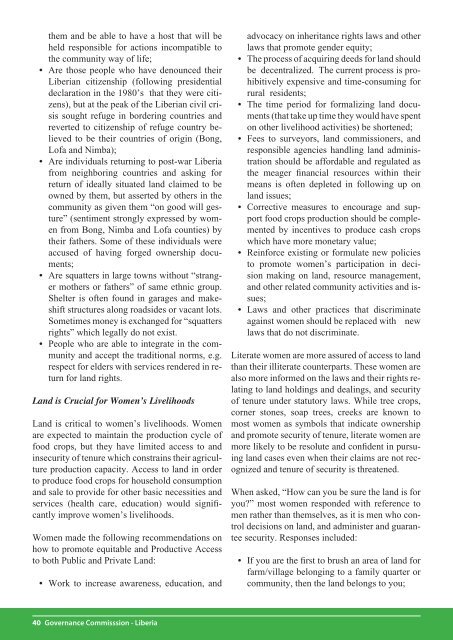Report: Regional Consultative Meetings on Land - Land Commission
Report: Regional Consultative Meetings on Land - Land Commission
Report: Regional Consultative Meetings on Land - Land Commission
Create successful ePaper yourself
Turn your PDF publications into a flip-book with our unique Google optimized e-Paper software.
•<br />
•<br />
•<br />
•<br />
them and be able to have a host that will be<br />
held resp<strong>on</strong>sible for acti<strong>on</strong>s incompatible to<br />
the community way of life;<br />
Are those people who have denounced their<br />
Liberian citizenship (following presidential<br />
declarati<strong>on</strong> in the 1980’s that they were citizens),<br />
but at the peak of the Liberian civil crisis<br />
sought refuge in bordering countries and<br />
reverted to citizenship of refuge country believed<br />
to be their countries of origin (B<strong>on</strong>g,<br />
Lofa and Nimba);<br />
Are individuals returning to post-war Liberia<br />
from neighboring countries and asking for<br />
return of ideally situated land claimed to be<br />
owned by them, but asserted by others in the<br />
community as given them “<strong>on</strong> good will gesture”<br />
(sentiment str<strong>on</strong>gly expressed by women<br />
from B<strong>on</strong>g, Nimba and Lofa counties) by<br />
their fathers. Some of these individuals were<br />
accused of having forged ownership documents;<br />
Are squatters in large towns without “strang-<br />
er mothers or fathers” of same ethnic group.<br />
Shelter is often found in garages and makeshift<br />
structures al<strong>on</strong>g roadsides or vacant lots.<br />
Sometimes m<strong>on</strong>ey is exchanged for “squatters<br />
rights” which legally do not exist.<br />
People who are able to integrate in the com-<br />
munity and accept the traditi<strong>on</strong>al norms, e.g.<br />
respect for elders with services rendered in return<br />
for land rights.<br />
<strong>Land</strong> is Crucial for Women’s Livelihoods<br />
<strong>Land</strong> is critical to women’s livelihoods. Women<br />
are expected to maintain the producti<strong>on</strong> cycle of<br />
food crops, but they have limited access to and<br />
insecurity of tenure which c<strong>on</strong>strains their agriculture<br />
producti<strong>on</strong> capacity. Access to land in order<br />
to produce food crops for household c<strong>on</strong>sumpti<strong>on</strong><br />
and sale to provide for other basic necessities and<br />
services (health care, educati<strong>on</strong>) would significantly<br />
improve women’s livelihoods.<br />
Women made the following recommendati<strong>on</strong>s <strong>on</strong><br />
how to promote equitable and Productive Access<br />
to both Public and Private <strong>Land</strong>:<br />
•<br />
Work to increase awareness, educati<strong>on</strong>, and<br />
40 Governance Commisssi<strong>on</strong> - Liberia<br />
•<br />
•<br />
•<br />
•<br />
•<br />
•<br />
advocacy <strong>on</strong> inheritance rights laws and other<br />
laws that promote gender equity;<br />
The process of acquiring deeds for land should<br />
be decentralized. The current process is prohibitively<br />
expensive and time-c<strong>on</strong>suming for<br />
rural residents;<br />
The time period for formalizing land docu-<br />
ments (that take up time they would have spent<br />
<strong>on</strong> other livelihood activities) be shortened;<br />
Fees to surveyors, land commissi<strong>on</strong>ers, and<br />
resp<strong>on</strong>sible agencies handling land administrati<strong>on</strong><br />
should be affordable and regulated as<br />
the meager financial resources within their<br />
means is often depleted in following up <strong>on</strong><br />
land issues;<br />
Corrective measures to encourage and sup-<br />
port food crops producti<strong>on</strong> should be complemented<br />
by incentives to produce cash crops<br />
which have more m<strong>on</strong>etary value;<br />
Reinforce existing or formulate new policies<br />
to promote women’s participati<strong>on</strong> in decisi<strong>on</strong><br />
making <strong>on</strong> land, resource management,<br />
and other related community activities and issues;<br />
Laws and other practices that discriminate<br />
against women should be replaced with new<br />
laws that do not discriminate.<br />
Literate women are more assured of access to land<br />
than their illiterate counterparts. These women are<br />
also more informed <strong>on</strong> the laws and their rights relating<br />
to land holdings and dealings, and security<br />
of tenure under statutory laws. While tree crops,<br />
corner st<strong>on</strong>es, soap trees, creeks are known to<br />
most women as symbols that indicate ownership<br />
and promote security of tenure, literate women are<br />
more likely to be resolute and c<strong>on</strong>fident in pursuing<br />
land cases even when their claims are not recognized<br />
and tenure of security is threatened.<br />
When asked, “How can you be sure the land is for<br />
you?” most women resp<strong>on</strong>ded with reference to<br />
men rather than themselves, as it is men who c<strong>on</strong>trol<br />
decisi<strong>on</strong>s <strong>on</strong> land, and administer and guarantee<br />
security. Resp<strong>on</strong>ses included:<br />
• If you are the first to brush an area of land for<br />
farm/village bel<strong>on</strong>ging to a family quarter or<br />
community, then the land bel<strong>on</strong>gs to you;


